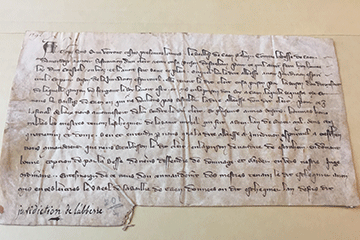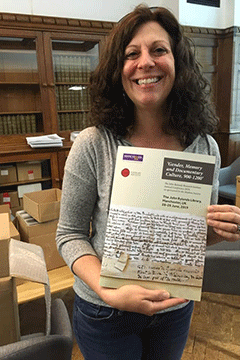
09/26/2023
Contrary to common belief, some medieval women wielded significant power. Nuns in France’s Normandy region, for example, carried enormous influence and legal control over the people — including men — living on their vast land holdings granted by royal decree.
That any women circa A.D. 1066 controlled the lives of multitudes is a forgotten fact that Laura Gathagan, an associate professor in SUNY Cortland’s Department of History, is bringing to light after discovering a scrap of ancient abbey recordkeeping that chronicled the religious women’s actions as judges, jailers and agricultural businesswomen.
On Wednesday, Oct. 4, Gathagan will discuss her research on the Abbey of Holy Trinity, Caen, in a talk titled “Abbess, Judge, Jailor: Authority and Imprisonment in Medieval Normandy.”
The lecture opens the 2023-24 Rozanne M. Brooks Lecture Series, which explores humanity’s age-old struggle for power through different lenses.
The talk will begin at 4:30 p.m. in Moffett Center, Room 115. Seating will be limited, so attendees are advised to arrive early to secure a seat. A reception to welcome Gathagan precedes the talk at 4 p.m. in the adjacent Brooks Museum.
Gathagan uncovered this revelation about the abbey, which was founded in June 1066 by Mathilda of Flanders, duchess of Normandy and queen of England, inside the John Rylands Research Institute and Library in Manchester, England. Her research-related travel was partly supported by a grant from the Karen Goodell '82 Faculty Development Fund.
Gathagan has found among rare 700-year-old documents that the abbesses of Holy Trinity held an important judicial role and the power to imprison offenders of the law. The journey of these manuscripts, and the abbesses who protected them against the vicissitudes of war and political upheaval, form the basis for this presentation.
“My research is related to a broader question about women and power in the Middle Ages,” she said.

“For women especially, we’re in a fight for our autonomy,” Gathagan said. “There is this false idea that, traditionally women didn’t have as many rights as they do now. But that is an absolute lie.”
The Brooks series features five planned lectures on the theme of “The Culture of Power.” The interdisciplinary talks will touch on topics ranging from extremist groups in today’s world to gendered power wielded centuries ago. Speakers will discuss how the drive for supremacy shapes religious movements, impacts the dynamics of filmmaking and pushes people to excel in physical feats.
The discussions all take place on Wednesdays at the same time and location, with a reception beforehand in the Brooks Museum. All events are free and open to the public.
The remaining presentations will include:
The Power of Extremism in Afghanistan — Sameer and K. Harris, refugees from Afghanistan before and after the departure of the U.S. forces in 2021. Nov. 1.
Empowerment Through Sport and Fitness — Amanda Tepfer, an assistant professor in SUNY Cortland’s Physical Education Department. Feb. 21, 2024.
Tibetan Buddhism, China and the Politics of Tension — Allen Carlson, an associate professor in Cornell University’s Government Department and director of Cornell’s China and Asia Pacific Studies program and advisor of its East Asia Program. March 20, 2024.
Framing Truth: Exploring Power Dynamics in Documentary Filmmaking — Samuel Avery, an associate professor in SUNY Cortland’s Communication and Media Studies Department and coordinator of Cortland’s annual Blackbird Film Festival. April 10, 2024.
The Brooks Series honors the late Distinguished Teaching Professor of sociology and anthropology emerita at SUNY Cortland, Rozanne M. Brooks, whose donated special collection of ethnographic objects to the Sociology/Anthropology Department established the Brooks Museum in 2001.
The 2023-24 Brooks Lecture Series is co-sponsored by the Cortland College Foundation and Cortland Auxiliary. For more information, contact Brooks lecture series organizer and Brooks Museum director Sharon Steadman, SUNY distinguished professor and chair of SUNY Cortland’s Sociology/Anthropology Department, at 607-753-2308.